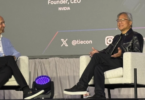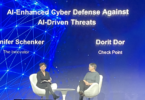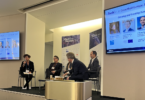How to create trustworthy technology innovation and effectively combat ransomware were two of the key themes at the World Economic Forum’s Annual Meeting on Cybersecurity 2021. Jennifer L. Schenker, The Innovator’s Editor-in-Chief, moderated a discussion on digital trust and the future of innovation that focused on how failure to provide the core components of digital trust – security, responsibility, and good governance – threaten to lead to a more fragmented, more isolated, and less innovative future.
The lack of trust in technology and the potential negative impact on innovation was the topic of the panel moderated by Schenker. How tech companies collect, manage, process, and share massive amounts of data is being increasingly scrutinized. Even though the executives and founders of companies are constantly professing a renewed commitment to privacy and corporate responsibility, promises have been broken, leading the public to question how much faith they should put in both the leaders and services leveraging these quickly evolving technologies. But the issues are not limited to new digital players. Cybersecurity failures, by traditional business and by governments, are eroding digital trust globally. It’s no surprise that due to ethical lapses, a lack of transparency, a lack of security and distrust of digital technologies is increasing. The session explored how to promote cybersecurity and responsibility to support trustworthy technology innovation.
A member of the European Parliament, spoke about how EU lawmakers were trying to come to grips with breaches of trust. She mentioned this week’s hearings in Brussels with Facebook whistleblower Frances Haugen. She also said it is important to anticipate new ethical challenges that could arrive in the metaverse.
A cybersecurity expert from Israel explained his company’s innovative approach to crowdsourcing information from cybersecurity experts and academics to anticipate new threats and then create cybersecurity startups to combat them. In addition to increasing cybersecurity, he said he believes trust in technology will be strengthened by moving to a system in which users own their own data, hold it in a digital wallet, have the power to give specific permissions for access, and have the possibility to charge money for their data.
The co-founder and executive director of an organization that works to defend Internet rights, including Internet access itself and freedom of expression, stressed that there is not just a trust deficit but a power deficit. Consumers need to have a voice and their digital rights need to be articulated and enforced.
A panelist from the United Arab Emirates said Dubai intends to become the second city in the world to allow autonomous vehicles on its roads. Ensuring vehicles can’t be hacked could be a question of life and death so the government is working closely with the private sector to make sure that cybersecurity and governance is in place.
A panelist from the tech sector talked about the important role of the Charter of Trust, an organization that aims to combine domain know-how and deepen a joint understanding between firms and policymakers of cybersecurity requirements and rules in order to continuously innovate and adapt cybersecurity measures to new threats.
The November 8-9 conference included two sessions on ransomware, which focused on how leadership at corporates should respond, the role of cryptocurrency and the importance of the exchange of best practice between companies and public-private partnerships.
The pandemic and the rise of cryptocurrencies have made it easier for cyber criminals to undertake ransomware attack and supply chains have emerged as key targets because attacks on supply chains help cyber criminals maximize their efficiency and return on investment. At the moment, entire supply chains are victims of two types of attacks: attacks that target software or IT service providers, using them to spread malware, and attacks that target physical supply chains, such as critical infrastructure
The ransomware threat is of particular concern because of the way it can impact business and ordinary consumers at scale. The attack on Colonial Pipeline is an example of that, said a panelist, because “it was the first cyber attack in history to become a pocket book issue for many thousands of people,” who had wait in line for gas and pay higher prices. These attacks are happening routinely leaving businesses unable to serve their customers and hospitals, schools and government services unable to provide services.
Just how bad is it? There has been 11 times more ransomware attacks in the last 12 months, said one panelist. Another pointed to an October VirusTotal report listed 130 different active ransomware families. A whopping 67% companies surveyed by cybersecurity solution vendor Fortinet said they have been victims of ransomware attacks and half of them said have been hit more than one time.
“It is starting to have a big impact on the economy and national security,” said a panelist. “We all need to work together to share best practice and improve infrastructure security to make it more difficult to attack a company.”
In a poll taken of participants during the session over 50% said public-private partnerships are one of the most important and effective ways to combat ransomware.
Panel members said emphasis needs to be placed on creating resilience through best practices and prevention; diplomatic efforts should focused on countries where ransomware actors are being harbored; law enforcement should aim to identify and track the perpetrators so they can be arrested the moment they set foot in countries that allow extradition and, whenever possible, cryptocurrency booty seized .
Additional controls on cryptocurrency markets are necessary to curb their use by criminals, said several panelists. “If cryptocurrencies want to be part of the global economy have to accept some of the responsibilities,” said the moderator. “We have to put in additional controls.” The challenge is to find ways to preserve the innovation, efficiency and consumer benefits of digital payments while reigning in dangerous uses.
While several panel members said it is important to find ways to get security tools inside corporate IT networks to work better together “this is a business problem, not a technology issue,” said a panelist.
Companies that adopt security by design as a strategy are proving to be the most resilient against ransomware attacks and are building trust with their customers, giving them a competitive advantage, he said.
CEO’s priorities are to get the company and customers back on-line. There is a push to pay, although they probably shouldn’t. The emphasis should be on how to be safe, to validate back-ups and prepare for ransomware attacks so it is not necessary to pay to get systems back up, said a panelist.
Panelists advised companies to protect themselves against ransom attacks by:
- Adding a cyber aware director to their board because most board directors don’t know enough to ask management the right questions.
- Making sure they have the basics of cybersecurity covered. 80% of ransomware exploits basic flaws.
- Building in security by design early in the process whenever your company adds something new to the network
- Buying software or services like Cloud computing only from companies who have a good track record on secure development.
- Using a mesh architecture rather than building in silos to ensure your company’s cybersecurity tools can work with each other.
If your company is breached act swiftly and responsibility to alert customers, said one of the panelists. Your company will be judged on the way it responds.
IN OTHER NEWS THIS WEEK:
FINANCIAL SERVICES
Report Says Banks Could Boost Revenues 4% By Adopting Digital-First Models
Traditional banks could increase their annual revenues by nearly 4% if they embrace the innovative business models used by digital-only players, according to an Accenture report. The analysis of the business models of nearly 100 leading traditional banks and over 200 digital-only players in 11 countries across North America, Europe, Asia-Pacific, and Latin America finds scope for an additional US$518 billion in incumbent revenues by 2025. Accenture identifies two common business models: vertically integrated, traditional business models; and non-linear adaptive models where the bank is a “packager”. The report says that while many traditional banks adopt the former model, they could achieve breakout growth if they unbundle their traditional products and partner with third parties to create and distribute new personalised customer offerings. Specifically, by layering non-linear business models on top of the traditional vertically integrated model, they could boost their annual growth rates by up to an additional 3.8%.
ENERGY
Race To Achieve Net Fusion Energy Heats Up
Helion, a U.S.-based fusion energy company focused on generating zero-carbon electricity from fusion, raised $500 million, with an additional $1.7 billion of commitments tied to specific milestones.
Helion says its seventh-gen fusion reactor prototype, called Polaris, will be the world’s first fusion generator to demonstrate net electricity production, and that it will do so as soon as 2024. Other firms, including the Bill Gates and MIT-backed Commonwealth Fusion Systems (CFS) are also working on providing practically limitless energy via nuclear fusion. CFS recently announced the successful test of its own magnet, which was measured at 20 Tesla strength while only consuming about 30 watts of energy. Helion is essentially in a race against CFS, which aims to have its fusion Tokamak reactor experiment, called SPARC, running by 2025, only a year after Helion estimates it will first produce electricity from fusion.
E.ON, Enel and Iberdrola Partner To Meet Growing Hydrogen Demand
German utility E.ON is partnering with Italian utility Enel and Spanish energy company Iberdrola to create a hydrogen production and distribution network in the Ruhr region in Germany. E.ON plans to produce 80,000 tons of hydrogen per year as part of the H2.Ruhr hydrogen program. The initiative aims to produce hydrogen and green ammonia to meet the growing demand from municipalities, as well as medium-sized and industrial companies. The demand for hydrogen in the Ruhr region will grow from 17TWh annually today to 150TWh in 2050, according to E.ON. The increase in demand is due to efforts by companies and government agencies to decarbonize operations.
MOBILITY
Twenty Airlines Commit To Using New Technologies To Minimize Climate Impact
Twenty airline members of the World Economic Forum’s Target True Zero initiative committed to utilizing new technologies, such as electric, hydrogen and hybrid aircraft, to address the challenge of climate change. The development and delivery of novel propulsion technologies – powered by sustainable energy sources – were highlighted as key towards helping the aviation industry minimize its environmental impact.
The signatory airlines– Aero, Air New Zealand, Air Nostrum, Alaska Airlines, Amelia, ASL Aviation Holdings, Braathens Regional Airlines, easyJet, Finistair, Icelandair, Iskwew Air, Loganair, Mokulele, Ravn Alaska, SoundsAir, Southern Airways Express, Surf Air Mobility, Viva Aerobus, Waltzing Matilda Aviation, Xwing – operate over 800 aircraft and carry over 177 million passengers on 1.8 million flights a year and hope to use this influence to create market demand for new types of aircraft.
Key commitments:
- Short-haul flights first – Shorter range flights were recognized as most likely to employ novel propulsion first. The signatories committed to working towards 30% of aircraft, that serve routes of 750km or less, that are added to their fleets from 2030 onwards employ novel propulsion technologies.
- Scaling the technology in the future – The airlines also committed to decarbonizing longer range aircraft, once this becomes technologically and economically viable.
- Partnership – The signatories called on aerospace manufactures to prioritize innovation that will allow them to meet these goals.
- Public-private cooperation – The Target True-Zero airlines also urged governments to do their part in supporting the transition to cleaner aviation. Key calls included establishing policies to provide incentives for operators to adopt these technologies and addressing the infrastructure issues needed to support their use in airports across the world.
Solar Powered Electric Vehicles Are Almost Ready To Hit The Road
A handful of entrepreneurs think solar-powered cars are poised for their day in the sun. Lightyear, a startup in the Netherlands, is developing a four-door car whose solar cells can generate enough electricity to power brief outings after a day of sitting in the sun. While the company’s Lightyear One resembles a conventional sedan, Aptera Motors of San Diego is taking another route. It is stretching the traditional image of a passenger vehicle by developing a two-seater featuring three wheels and a dolphin-shaped body.
Ford Partners With Israel’s Watergen To Install Water-From-Air Tech On Its Vehicles
Ford Motor Company has approached Israeli water-from-air company Watergen to collaborate with the giant American car manufacturer on its off-grid recreational vehicles.The project will result in Watergen’s Mobile Box, the world’s first vehicle on-board water generating system, to be pre-installed on Ford vehicles. Watergen’s innovative Mobile Box device is the world’s first vehicle on-board drinking system capable of extracting clean water from ambient air.
FOOD AND AGRICULTURE
Will Microbiome Science Be A Future Driver Of Food System Transformation?
At a special COP26 session on nutrition and health, hosted by the U.N. Climate Change Global Innovation Hub, speakers discussed technologies that could help to address food and nutrition challenges while limiting climate change to 1.5 degree Celsius of warming. In a talk at the session, Eagle Genomics CEO Anthony Finbow made a case for microbiome science as a future driver of food system transformation.
“We don’t need to go into space to discover the new frontier,” Finbow said at the session. “We need to look within ourselves and within the soil to really understand how we are going to solve for climate change.” That new frontier is in the human gut, where trillions of bacteria interact with human epithelial cells, sending signals to each other across a layer of mucus, he says. And it’s in the rhizosphere, the dynamic space around a plant’s roots where microorganisms come to feed on nutrients produced by the plant, and provide protection from pathogens in exchange.
Businesses are now unlocking microbial knowledge to improve human health, create safer products, and grow food crops more sustainably. DayTwo of Israel analyzes individuals’ microbiome data to provide personalized nutrition recommendations. Joyn Bio, a collaboration between Ginkgo Bioworks and Leaps by Bayer, is engineering improved microbial strains that can deliver more nitrogen to plants, cutting down on the need for fertilizers. U.K.-based Eagle Genomics wants to become a network for businesses like these—as well as farms and research establishments—to collaborate and share data. The company’s cloud software platform uses network science, AI, and causal analysis to analyze microbes and their relationships to each other.
McDonald’s joins PepsiCo as Founding Partner of AgMission Carbon Initiative
McDonad’s USA has joined AgMission, a global platform enabling collaboration between farmer associations, corporates, researchers, and other stakeholders to reduce greenhouse gas emissions in agriculture. The fast food chain — one of two founding partnersof AgMission along with PepsiCo, which signed up in April — is committing $5 million to the initiative over the next five years to develop and implement climate-smart farming solutions at scale.
RETAIL
Carrefour Enters Into A Global Strategic Partnership With Meta
Carrefour announced the launch of an ambitious strategic partnership with Meta (the new name for Facebook) , which will be rolled out across the group’s nine integrated countries (France, Italy, Spain, Romania, Poland, Belgium, Taiwan, Argentina, and Brazil).The partnership will span Carrefour’s business from internal communication and employee experience through to customer relations, digital advertising and the digitisation of leaflets, local communication and social commerce. It will include multiple Meta platforms and services: Facebook, Instagram, WhatsApp, Messenger and Workplace.
To access more of The Innovator’s News In Context articles click here.







